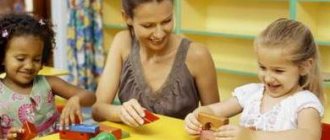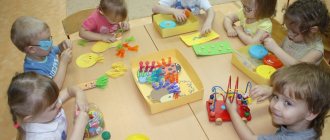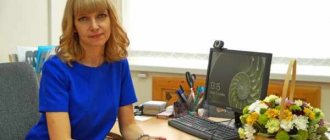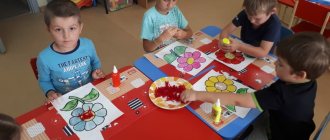How to choose a topic for self-education?
There are only two main criteria:
- requirement to study the topic from the outside (formulated in regulatory documents, in particular, in the Federal State Educational Standard for Preschool Education);
- the work of the teacher himself (lack of experience and knowledge to resolve a particular pedagogical situation).
Thus, before choosing a topic, you need to familiarize yourself with the regulatory framework for preschool education and analyze your own experience.
According to the Federal State Educational Standard, a preschool child develops in the following areas:
- social and communicative;
- educational;
- speech;
- artistic and aesthetic;
- physical.
Approximate topics of self-education for a preschool teacher according to the Federal State Educational Standard (2017 and later)
In accordance with the identified areas, topics on self-education for kindergarten teachers according to the Federal State Educational Standard can be as follows:
- Methods and means of amplification of preschool child development.
- Pedagogical diagnostics in a preschool institution.
- Individual approach in preschool education.
- Means and methods of developing safe life skills in preschoolers.
- Development of emotional intelligence in preschoolers.
- Guiding the play activities of preschool children.
- Cultivating kindness in preschoolers.
- Raising responsiveness in preschool children.
- Fostering sense of purpose in preschool children.
- Cultivating honesty and truthfulness in preschoolers.
- Formation of ideas about the small homeland among preschoolers.
- Development of creative abilities in preschool children.
- Formation of prerequisites for educational activities in children of senior preschool age.
- Cultivating curiosity in preschoolers (in classes, in communication, play, work).
- Formation in preschoolers of ideas about the signs, qualities and properties of objects in the surrounding world.
- Familiarization of preschoolers with the biocenosis of a forest (meadow, pond).
- Formation of ideas about space in preschoolers.
- Formation of ideas about inanimate nature in preschool children (natural phenomena, seasons, change of day and night).
- Formation in preschoolers of ideas about the shape, size, spatial relationships of objects.
- Formation of the concept of number in preschoolers.
- Development of forms of communication in preschoolers.
- Development of coherent speech in preschool children (in communication, play).
- Teaching children 4-7 years old basic analysis of a literary work.
- Teaching preschoolers to retell literary works.
- Teaching preschoolers to read poems expressively.
- Creative storytelling in kindergarten.
- Literacy training in preschool educational institutions.
- Non-traditional techniques of visual activity in kindergarten.
- Health-saving technologies in preschool education.
- Formation of cultural and hygienic skills in children of early and preschool age.
- Formation of self-service skills in preschoolers.
- Creating psychological comfort in a preschool group.
- Computer technologies in preschool education.
- Continuity of preschool and primary education.
- Psychological and pedagogical assistance in the family in the education and development of preschool children.
In 2016, changes and additions were made to the Federal State Educational Standard, in particular, on the education of children with disabilities. In this regard, one of the self-education topics for kindergarten teachers according to the Federal State Educational Standard 2022 could be:
- "Inclusive education in preschool settings."
In addition to topics in a specific area, you can choose a topic related to the work of a preschool institution as a whole:
- Planning work in a preschool institution according to the Federal State Educational Standard.
- Developing subject-spatial environment in preschool educational institutions.
- Development of partial preschool education programs.
- Innovative forms of working with parents of preschool children.
The list of topics on self-education for kindergarten teachers according to the Federal State Educational Standard 2022 may include the following topics:
- Variability of preschool education services at the present stage.
- Experimental activities in preschool educational institutions.
- Quality of preschool education: evaluation criteria.
- Social relations in preschool education.
Work on self-education of a kindergarten teacher according to the Federal State Educational Standard
Work plan for self-education of a preschool teacher
Author: Ivanova Victoria Olegovna;
teacher, Municipal preschool educational institution "Kindergarten of a combined type No. 156", Saratov Description of work: I suggest you familiarize yourself with my first individual self-education plan for a teacher on the topic "Unlocking the creative potential of a child’s personality through his individualization." This material will be useful to teachers and educators of preschool educational institutions. I would be grateful for constructive criticism, since this is my first time doing this work. Individual self-education plan 2016-2017 academic year Position: teacher Full name:
Victoria Olegovna Ivanova
Education:
higher, SSTU named after Yu.A. Gagarin, specialty - Psychologist.
Psychology teacher Professional retraining courses:
“Educator (Pedagogy and psychology. Educational work)”, duration of training - 3.5 months (504 hours)
Duration of training:
December 2016 - March 2022
Individual topic:
Unlocking the creative potential of a child’s personality through its individualization.
When work on the topic began:
December 2016
When work on the topic is expected to be completed:
November 2022.
The purpose of self-education on the topic:
to learn to create conditions for the individualization of educational relations that provide the opportunity for the child’s social self-determination, independence and initiative;
improve your scientific, methodological, theoretical level and professional skills. Objectives:
1. Increase your own level of knowledge by studying the necessary literature, attending various thematic seminars and webinars.
2. To study the psychological and age characteristics of preschoolers. 3. Study the document Federal State Educational Standard for Preschool Education (Order of the Ministry of Education and Science dated October 17, 2013 No. 1155); 4. To form in children adequate ideas about the relationships in the “man-environment” system and in the surrounding world itself, based on universal human principles; 5. Individualization of education for each child; 6. Stimulate creative expression of oneself to the world and knowledge of the world through creative ways of mastering the surrounding reality in specific types of children's activities; 7. Create conditions for the child to develop independence in planning and implementing his plans; 8. Timely identify, support and develop children’s abilities and children’s interests; 9. To develop the activity of a preschooler in various types of children's activities under the conditions of socialization and individualization of children; 10. Raising your own general cultural level. 11. Thematic publications in the media The main issues planned for study:
- creative methods of working with preschoolers in various types of activities, - integration of pedagogical and educational methods, their inclusion in the process of individualization, - disclosure of the creative potential of each child’s personality, - individual personal approach as a promising direction of modern pedagogy and educational process.
Stages of material development:
diagnostic.
What is the expected result:
increasing one’s own general cultural level, developing professional and pedagogical competence, improving work with children, increasing professional skills.
Form for presenting results:
- speech (report) at a meeting of the methodological council, pedagogical council, followed by submission of the written text of the speech (report);
- publications in the media. Appendix No. 1 WORK PLAN FOR SELF-EDUCATION Section 1. Study of methodological literature on the topic. 1. Azarov Yu.P. The skill of a teacher, Education, 1971. 2. Asmolov A.G. Psychology of individuality.-M.: Smysl, 2001.-416s 3. Vygotsky L.S. “Training and development in preschool age // Kindergarten. Control. 2001. No. 1-3. p.2-3. 4. Makhaneva M.D. Individual approach to a child in a preschool educational institution: Organizational and methodological aspects. - M.: TC Sfera, 2005. - 57 p. - (Library of the head of the preschool educational institution). 5. Fundamentals of pedagogical skills, ed. I.A.Zyazyun. M., 1989. 6. Petrovsky V. A. “Teachers and children: sources of growth.” - M-, 1994. 7. Help me do it myself, M. Montessori./ Comp., intro. article by M.V. Boguslavsky, G.B. Kornetov. -M.: Publishing house. house "Karapuz", 2000. - 272 p., ill. — (Pedagogy of childhood) Scientific editor S.V. Lykov 8. Svirskaya L.V. Individualization of education: the right start: educational and methodological manual for workers of preschool educational institutions.-M.: Obruch, 2011.-240p. Section 2. Methodological work on self-education. 1. View the forms of educational activities at the kindergarten level. (DECEMBER-MAY) 2. Participation in the competition of professional skills of teachers of preschool educational institutions (kindergarten level). (FEBRUARY) 3. Message for preschool teachers on the topic: “Unlocking the creative potential of a child’s personality through his individualization.” (MARCH) Section 3. Working with children 1. Self-analysis of teaching activities. (SEPTEMBER-MAY) 2. Assistance in preparing and holding the holiday for the day of February 23 and March 8 (FEBRUARY-MARCH) 2. Assistance in preparing and holding the holiday “This Victory Day”. (APRIL-MAY) 3. Assistance in preparing and conducting intra-garden and group events. Section 4. Working with parents. 1. Development of a plan for working with parents for the year. (JANUARY) 2. Participation in the preparation and conduct of the final parent meeting. (MAY)
We recommend watching:
Self-education of a preschool teacher Report on self-education of a kindergarten teacher Self-education of a teacher on the topic: Children's experimentation Long-term plan for self-education of a kindergarten teacher
Similar articles:
Professional development of preschool teachers in a small town
How to work by topic
Work on each of the listed topics begins with an analysis of the literature (an approximate list of sources is given below). When reading books, the teacher identifies the main thoughts, ideas, and judgments of the authors. So, taking up the topic of using didactic games to develop safe life skills in children, the teacher:
- draws attention to the peculiarities of organizing didactic games in different age groups;
- content of work on life safety in preschool educational institutions.
Then the teacher thinks through or also takes from books potentially dangerous situations that need to be avoided, and based on the knowledge gained, compiles a card index of games. He develops games himself or takes them from sources. Systematized materials are tested in practice.
Self-education
Independence in play is formed gradually, in the process of playful communication with adults, older children, and peers. The development of independence largely depends on how the child’s life is organized in the game. Waiting until he starts playing on his own means deliberately hindering the development of a child’s personality.
One of the important pedagogical conditions that contribute to the development of play in a young child is the selection of games by age. But toys that adults like do not always have educational value for children.
For a game to be interesting for a child (and even for an adult, who will most likely often be his partner) it must be quite understandable and simple and logical according to the rules. The goal of the game should also be simple, understandable and, in principle, achievable. At the same time, it should have a very large, controlled variation in the development of the game’s plot and events. And the player (even a small one) must consciously choose and try to implement some specific option that is advantageous from his point of view. But at the same time, there must be a large element of chance, which makes the game emotional, levels out skill and makes winning possible even for a beginner. After all, if one player always wins and the other loses, the “always losing” player quickly loses the desire to play. And if the “master” is forced to give in all the time, the desire to play with him disappears. Randomness puts players in almost identical conditions. Luck gives chances to everyone, but who managed to realize them? And when a child beats “dad himself” and not because he gave in, but in a “fair battle” - there is no limit to delight.
The developmental side of the game cannot be discounted. A child, playing a board game, even the simplest one, develops his imagination, learns to count quickly, learns to make a decision and begins to understand the relationship between decision-making, his actions and their results. His erroneous actions are obvious to himself and he is already beginning to think about how not to repeat them or avoid them, he understands which situation is bad and which is good. He develops not only tactical, but also strategic thinking.
When purchasing a game, it is important to pay attention not only to novelty, attractiveness, cost, but also to pedagogical expediency. Before you make your next purchase, it's a good idea to talk to your son or daughter about what kind of game he needs. Often girls play only with dolls, so they are often deprived of the joy of playing games that develop ingenuity, resourcefulness, and creativity. Girls play with dolls either alone or only with girls. They have no common interests with boys and there are no prerequisites for the emergence of friendly relationships between children. Boys usually play with cars and children's weapons. Such toys also limit the circle of communication with girls. It’s better, when we are adults, not to divide games into “girls” and “boys”.



